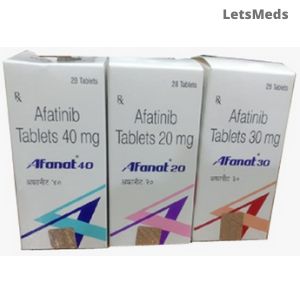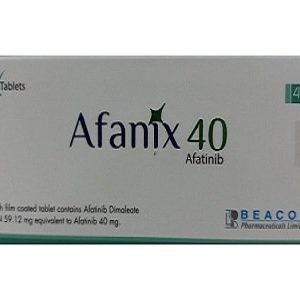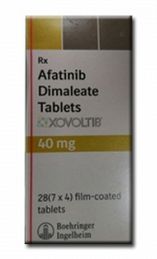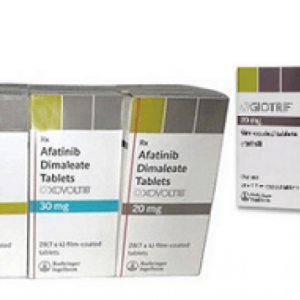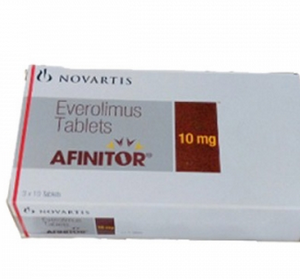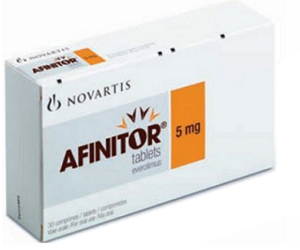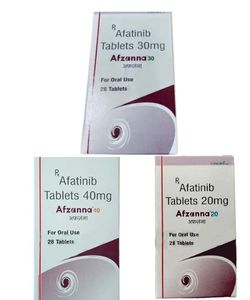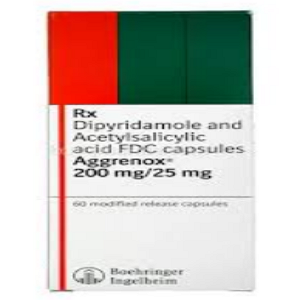-
( reviews)
Afanat Tablets, Afatinib
$50.00Medicine Overview of Afanat Afatinib Tablet:Afatinib is a tyrosine kinase inhibitor, which is used in the treatment of non-small cell lung cancer. It is used to treat patients with non-small cell lung cancer (NSCLC) whose tumors have certain (non-resistant) abnormal epidermal growth factor receptor (EGFR) genes and patients with metastatic, squamous NSCLC progressing after platinum-based chemotherapy.How Afanat Afatinib Tablet works:Afanat 30mg Tablet blocks the activity of a group of proteins called ErbB family (including EGFR [epidermal growth factor receptor or ErbB1], HER2 [ErbB2], ErbB3 and ErbB4), proteins involved in the spread and growth of cancer cells.Alternative Generic Xovoltib Tablet:Afanat Tablet by NatcoAfanix Tablet by BeaconLucifa by Lucius PharmaceuticalsPrecautions for Generic Afatinib Tablet:Precaution should be taken if patient have:- Cardiac risk factors
- Lower body weight
- History of keratitis
- Ulcerative keratitis
- Severe dry eyes
- History of gastrointestinal ulceration
- Diverticular disease
- Bowel metastases
- Renal and hepatic impairment
Side Effects of Generic Gilotrif:Report to the physician immediately if the patients are having any of these following symptoms:- Lung infiltration
- Pneumonitis
- Hepatic failure
- Cutaneous reactions
- Diarrhoea
- Stomatitis
- Nausea
- Vomiting
- Dyspepsia
- Pyrexia
- Muscle spasms
- Cystitis
- Pruritus
Where to buy Generic Afatinib Tablet online?If you are also confused about where to find the afatinib tablets, then you should choose the option. there is an pharmacy known as LetsMeds Trusted Pharmaceuticals Exporter that are providing this medicine at a discounted rate which is impossible to get normally. At LetsMeds we deliver Generic Gilotrif Tablet online at wholesale price to countries including China, Russia, Ukraine, USA, UK, Philippines, Singapore, Thailand, Australia, UAE, Saudi Arabia, Canada, Nigeria, Taiwan, Hong Kong, Malaysia, Vietnam, Cambodia, Netherlands, Chile, Brazil, New Zealand and other countries from India. Fill our “Ask For Price” form to know the detailed information about the Afatinib Tablet Afanat Indian Gilotrif online. -
-
( reviews)
Afanix 阿法替尼 Tablets
$50.00产品介绍:
阿法替尼于2013年7月在美国上市,之后陆续在全球70多个国家获批用于治疗EGFR突变的非小细胞肺癌患者。临床试验数据显示,阿法替尼可明显延长EGFR突变的非小细胞肺癌患者的生存期。
阿法替尼是第二代EGFR TKI(酪氨酸激酶抑制剂),与第一代可逆的EGFR TKI不同的是,阿法替尼会不可逆地与EGFR结合,从而达到关闭癌细胞信号通路、抑制肿瘤生长的目的。
阿法替尼是第一个也是唯一一个与最好的化疗方案相比可延长最常见EGFR突变类型肺癌患者生存的TKI7-8,对一线化疗或者第一代TKI治疗(即易瑞沙、凯美纳或特罗凯)治疗失败的病人,能显著改善无进展生存期。
阿法替尼(中文商品名吉泰瑞)于2017年2月已获中国药管局(CFDA)批准进口。此前,该药在70多个国家被批准用于治疗EGFR突变阳性非小细胞肺癌患者,并在多个国家成为了EGFR靶向药物的首选。
阿法替尼在2016年分别获得美国FDA和欧盟批准用于治疗铂类化疗时或化疗后病情恶化的晚期肺鳞状细胞癌患者。
碧康制药生产的Afanix是该药在全球的首仿药,也是迄今为止唯一获得政府监管机构批准合法生产的仿制药。
碧康制药由欧洲财团参与投资,是南亚地区唯一执行欧盟技术规范,并且在孟加拉两大证券交易所主板上市的大型制药企业,产品符合欧洲药典和美国药典标准。
相比其他来源不清晰的所谓同一种仿制药,即使其主要成份含量与碧康产品相接近,但由于不具备严格规范的GMP标准生产场所和政府部门的严格监管,其产品中影响药物吸收率的溶出度和生物利用度也与碧康产品具有很大差异。
为保证用药安全,敬请谨慎选择!
适应症:
适用于晚期EGFR基因突变非小细胞肺癌的治疗和HER2阳性的晚期乳腺癌患者。阿法替尼是一种口服药物,是表皮生长因子受体(EGFR)和人表皮受体2(HER2)酪氨酸激酶的不可逆抑制剂,是第二代EGFR靶向药物。
适用于用于治疗铂类化疗时或化疗后病情恶化的晚期肺鳞状细胞癌患者。
用法与用量:
阿法替尼的推荐剂量是40mg/天,每天1次,直至疾病进展或患者无较长耐受。 口服,空腹服用,至少餐前1小时或餐后2小时服用。
-
-
( reviews)
Afatinib 40 mg Xovoltib Tablets
$50.00About Afatinib Xovoltib 40mg Tablets
Generic Afatinib 40mg is a
prescription drug. It comes as a tablet you take by mouth. It is a type of
biological therapy called a tyrosine kinase inhibitor (TKI).Xovoltib 40mg Uses :
Xovoltib
is used to treat non-small cell lung cancer (NSCLC) that is metastatic spread
to other parts of the body besides lungs and has abnormal epidermal
growth factor (EGF) receptor genes. These abnormal genes promote the growth of
cancer cells. It stops the cancerous cells to develop their growth.
XOVOLTIB COMMON SIDE EFFECTS :
· Mouth
sores, diarrhea, pain/redness/swelling of lips, dry/itchy skin, acne, nose
bleed, runny nose, and nausea/vomiting or loss of appetite may occur. If any
of these effects persist or worsen, tell your doctor or pharmacist promptly.
· Tell your doctor right away if you have any serious side effects, including:
signs of eye disease such as vision changes, eye redness/pain, light
sensitivity, eye discharge· Signs
of low level of potassium in the blood such as muscle cramps, weakness,
irregular heartbeat.· Signs
of a bladder infection (such as burning/pain when you urinate, urgent or frequent
urination, fever)· Signs
of skin infection around nails/toenails (such as skin irritation/redness around
the nail, change in nail color)
Symptoms
of lung problems such as trouble breathing, chest pain, symptoms of heart a failure such as swelling ankles/feet, unusual tiredness.
This is not a complete list of possible side
effects. If you notice other effects not listed above, contact your doctor or
pharmacist.AFATINIB TABLETS PRECAUTIONS :
·
Before
taking Afatinib tablets, tell your doctor or pharmacist if you are allergic to
it; or if you have any other allergies. This product may contain inactive
ingredients, which can cause allergic reactions or other problems. Talk to your
pharmacist for more details.·
Before
using this medication, tell your doctor or pharmacist your medical history,
especially of: kidney problems, liver problems, eye disease (such as severe dry
eyes, keratitis), and use of contact lenses.·
This
drug may cause blurred vision. Do not drive, use machinery, or do any activity
that requires clear vision until you are sure you can perform such activities
safely. Limit alcoholic beverages.·
This
medication may make you more sensitive to the sun. Avoid prolonged sun
exposure, tanning booths, and sunlamps. Use a sunscreen and wear protective clothing
when outdoors.·
Before
having surgery, tell your doctor or dentist about all the lucifa products you
use (including prescription drugs, nonprescription drugs, and herbal products).·
This
medication is not recommended for use during pregnancy. It may harm an unborn
baby. It is important to prevent pregnancy while taking this medication and for
at least 2 weeks after treatment. Therefore, females must use reliable forms of
birth control (such as condoms, birth control pills) during treatment and for
at least 2 weeks after the end of treatment. If you become pregnant or think
you may be pregnant, tell your doctor right away.·
Since
this drug can be absorbed through the skin and lungs and may harm an unborn
baby, women who are pregnant or who may become pregnant should not handle this
medication or breathe the dust from the tablets.·
It is
unknown if this drug passes into breast milk. Because of the possible risk to
the infant, breast-feeding while using this drug and for 2 weeks after stopping
this drug is not recommended. Consult your doctor before breastfeeding.STORAGE REQUIREMENT :
Store at 25°C (77°F); excursions are permitted
between 15°C and 30°C (59°F and 86°F).Dispense in an original bottle;
protect from high humidity and light.
XOVOLTIB TABLETS INTERACTIONS :
Afatinib
Tablets can interact with other medications, vitamins, or herbs you may
be taking. An interaction is when a substance changes the way drug works. This
can be harmful or prevent the drug from working well.
To help avoid interactions, your doctor should
manage all of your medications carefully. Be sure to tell your doctor about all
medications, vitamins, or herbs you’re taking. To find out how this drug might
interact with something else you’re taking, talk to your doctor or pharmacist. -
-
( reviews)
Afatinib Dimaleate Tablets In India Xovoltib
$50.00ABOUT AFATINIB DIMALEATE TABLETS:
Afatinib Dimaleate Tablets
is a physician endorsed medicate. It comes as a tablet you take by mouth. It is
a kind of natural treatment called a tyrosine kinase inhibitor (TKI).
MEDICINAL USES:
The
recommended dose of GILOTRIF is 40 mg orally once daily until progression or no
longer tolerated by the patient. Take GILOTRIF at least 1 hour before meals or
2 hours after meals
Afatinib Dimaleate Tablets is utilized to treat non-little cell lung disease
(NSCLC) that is metastatic (spread to different parts of your body other than
your lungs), and has unusual epidermal development factor (EGF) receptor
qualities. Also treated HER2-positive advanced
breast cancer patients. These unusual qualities advance the development
of malignancy cells.AFATINIB DIMALEATE TABLETS SIDE EFFECTS:
·
With
increasing doses, hypophosphatemia, folliculitis, elevated transaminases,
non-specific intestinal obstruction, decreased platelets, congestive heart
failure, deep venous thrombosis, and pulmonary embolism may occur.·
Tell
your specialist immediately on the off chance that you have any genuine
reactions, including: indications of eye malady, (for example, vision changes,
eye redness/torment, light affectability, eye release)·
Indications
of low level of potassium in the blood, (for example, muscle spasms, shortcoming,
unpredictable pulse),·
Indications
of low level of potassium in the blood, (for example, muscle spasms, shortcoming,
unpredictable pulse)·
Indications
of bladder contamination, (for example, consuming/torment when you urinate,
dire or visit pee, fever)·
Indications
of skin disease around nails/toenails, (for example, skin disturbance/redness
around the nail, change in nail shading), side effects of lung issues (for
example, inconvenience breathing, chest torment)·
Manifestations
of heart disappointment, (for example, swelling lower legs/feet, bizarre
tiredness).·
The
most common dose-limiting toxicities (DLTs) are diarrhea, hypertension, and
rash.AFATINIB DIMALEATE TABLETS
PRECAUTIONS:·
Before taking Afatinib
Dimaleate Tablets, tell your specialist or drug specialist on the off chance
that you are hypersensitive to it·
Diarrhea: Diarrhea can
cause dehydration and kidney failure. Afatinib specifications do not respond to
severe and antidiarrheal medications prolonged diarrhea without giving
GILOTRIF.·
Blister and exfoliative
skin diseases: afatinib tablets 0.15% of patients have severe bullae, blisters,
and exfoliating lesions. Reacts to life-threatening skin to stop the drug. Does
not give GILOTRIF to severe and prolonged skin reactions.·
Interstitial lung
disease (ILD): occurs in 1.5% of patients. Acute attack or worsening of lung
symptoms is not given to GILOTRIF. If diagnosed ILD terminates GILOTRIF.·
Liver toxicity: Fatal
liver injury occurred in 0.18% of patients. Monitor with regular liver tests.
The GILOTRIF is not given or terminated for severe or worsening liver tests.·
Keratitis: Occurs in
0.8% of patients.·
Embryonic fetal
toxicity: May cause fetal harm. Advise women on the potential harm to the fetus
and use efficient contraception.STORAGE REQUIREMENTS:
Store at 25°C (77°F) and
allow out to 15°-30°C (59°-86°F) [see USP controlled room temperature].Dispensing
drug in original container to avoid exposure to high humidity and light. -
( reviews)
Afinitor 10mg Everolimus Tablets
$50.00EVEROLIMUS AFINITOR 10MG TABLETS :
Everolimus is an immunosuppressant. It works by blocking the action of certain
blood cells in the immune system that may cause the body to reject the
transplanted organ.Afinitor 10mg Tablet is utilized as a part of breast cancer,
pancreatic cancer, lung cancer, and kidney cancer. It is likewise used to treat
certain sorts of cutting edge or dynamic cancers of the stomach, digestive
organs, or pancreas. Everolimus is additionally used to treat certain
non-malignant (considerate) cancers of the mind or kidney in individuals with a
specific hereditary condition called tuberous sclerosis complex.Afinitor 10mg Tablet Uses :
It is used with other medications (such as cyclosporine) to prevent
rejection of a kidney transplant. Everolimus 10mg Tablet is also used with other
medications (such as tacrolimus) to prevent rejection of a liver transplant.This drug control gives data about the Afinitor brand of
everolimus. Zortress is another brand used to avoid organ
dismissal after a kidney transplant.How Afinitor Tablet works :
Swallow it as an entire. Try not to bite, pound or break it.
Afinitor 10mg Tablet might be taken with or without nourishment, yet it is
smarter to require it at a settled investment.Everolimus 10mg Tablet smothers the action of the body’s
insusceptible framework and counteracts the dismissal of the transplanted organ.Side Effects of Everolimus Tablets :
· Get crisis therapeutic help in the event that you have any of
these indications of an unfavorably susceptible response: hives; chest pain,
troublesome breathing; swelling of your face, lips, tongue, or throat.· Quit utilizing Afinitor and call your specialist without a
moment’s delay in the event that you have genuine symptoms like:·
New or exacerbating hack, wheezing, feeling shy of breath;·
Cutting chest pain, hack with yellow or green bodily fluid;·
Seizure (shakings);·
White patches or wounds inside your mouth or on your lips;·
Swelling, quick weight pick up, urinating not as much as common or
not under any condition;·
Fever, Stomatitis·
Renal disappointment·
The medicine may cause your cholesterol/triglycerides or blood sugar
to increase.
Precautions and Warnings :
· Cooperation with
liquor is obscure. If it’s not too much trouble counsel your specialist.· Everolimus 10mg Tablet
is perilous to use during pregnancy.· There is certain
confirmation of the human fetal problem, however, the advantages from use in
pregnant women might be satisfactory regardless of the hazard, for instance in
perilous circumstances. If you don’t mind counsel your specialist· Afinitor 10mg Tablet
is likely hazardous to use during lactation. Constrained human information recommends
that the medication could speak to a huge hazard to the infant.· The medicine may
influence male or female richness; counsel your specialist on the off chance
that you are wanting to have a tyke.· Try not to drive
unless you are feeling great.· As weakness is a
typical reaction with Afinitor and this may influence your capacity
to drive· The medicine sheltered to use in patients with kidney illness. No measurement
modification of the medicine is prescribed.· This Tablet
ought to be utilized with alert in patients with a liver infection. Dosage
alteration of the tablet might be required. If it’s not too much
trouble counsel your specialist.· Utilization of
Afinitor Tablet isn’t prescribed in patients with extreme liver disease.STORAGE REQUIREMENTS :
Store at room temperature
of 25°C (77°F); excursions permitted to 15°C to 30°C (59°F to 86°F). Protect
from light; protect from moisture.MEDICINE INTERACTIONS :
Some products that may interact with this drug include: other
drugs that weaken the immune system/increase the risk of infection (such as
natalizumab, rituximab), ACE inhibitors (such as captopril, lisinopril).
Other medications can affect the removal of everolimus from your body, which
may affect how this medicine works. Examples include :
azole antifungals (such as itraconazole, ketoconazole),
boceprevir,
cobicistat,
macrolide antibiotics (such as clarithromycin,
erythromycin),
HIV protease inhibitors (such as atazanavir, ritonavir),
rifamycins (such as rifabutin, rifampin),
St. John’s wort, telaprevir, telithromycin, among others. -
( reviews)
Afinitor Everolimus 5mg Tablets
$50.00ABOUT AFINITOR
AFINITOR is an immunosuppressant. It works by blocking the
action of certain blood cells in the immune system that may cause the body to
reject the transplanted organ.MEDICINAL
USESAFINITOR is used with other medications (such as
cyclosporine) to prevent rejection of a kidney transplant. Everolimus is also
used with other medications (such as tacrolimus) to prevent rejection of a
liver transplant.
AFINITOR COMMON SIDE EFFECTS:
·
Constipation, headache, nausea, and sores in the
mouth/throat may occur. If any of these effects persist or worsen, tell your
doctor or pharmacist promptly.·
Tell your doctor right away if you have any
serious side effects, including: swelling hands/ankles/feet, wound problems such
as infection, slow wound healing, opening of wound.·
Decreased sexual ability (in men), chest
pain/pressure, shortness of breath, unusual bruising/bleeding.·
Everolimus may cause your
cholesterol/triglycerides or blood sugar to increase.
AFINITOR PRECAUTIONS:
· Before taking everolimus, tell your doctor or
pharmacist if you are allergic to it; or to sirolimus or temsirolimus; or if
you have any other allergies. This product may contain inactive ingredients,
which can cause allergic reactions or other problems. Talk to your pharmacist
for more details.· Before using this medication, tell your doctor or
pharmacist your medical history, especially of: high cholesterol/triglyceride
levels, any recent/current infections, diabetes, liver disease, certain
hereditary enzyme problems (galactose intolerance, Lapp lactase deficiency,
glucose-galactose malabsorption).· Do not have immunizations/vaccinations
without the consent of your doctor. Avoid contact with people who have recently
received live vaccines (such as flu vaccine inhaled through the nose).· Since this medication may increase your risk of
skin cancer, avoid prolonged sun exposure, tanning booths, and sunlamps. Use a
sunscreen and wear protective clothing when outdoors.· Tell your doctor if you are pregnant or plan to
become pregnant. You should not become pregnant while you are taking
everolimus. Everolimus may harm an unborn baby.·
Ask about reliable forms of birth control while
taking this medication and for 8 weeks after stopping treatment. If you become
pregnant, talk to your doctor right away about the risks and benefit of this medication. It is unknown if this medication passes into
breast milk. Because of the possible risk to the infant, breast-feeding while
using this drug and for 2 weeks after stopping treatment is not recommended.
Consult your doctor before breast-feeding.
STORAGE REQUIREMENTS:
Store at room temperature of 25°C (77°F); excursions
permitted to 15°C to 30°C (59°F to 86°F). Protect from light; protect from
moisture.AFINITOR INTERACTIONS:
Some products that may interact with this drug include: other
drugs that weaken the immune system/increase the risk of infection (such as
natalizumab, rituximab), ACE inhibitors (such as captopril, lisinopril).Other medications can affect the removal of everolimus from
your body, which may affect how everolimus works. Examples include :azole antifungals (such as itraconazole,
ketoconazole),
boceprevir,
cobicistat,
macrolide antibiotics (such as
clarithromycin, erythromycin),
HIV protease inhibitors (such as
atazanavir, ritonavir),
rifamycins (such as rifabutin, rifampin),
St. John’s wort, telaprevir,
telithromycin, among others.This document does not contain all possible drug
interactions. Keep a list of all the products you use (including
prescription/nonprescription drugs and herbal products) and share it with your
doctor and pharmacist -
( reviews)
Afzanna Afatinib Tablets
$50.00What are Afzanna Afatinib 20mg Tablets?
Afatinib 40mg Tablets, sold under the brand name Gilotrif Tablets among others, is a medication used to treat non-small cell lung carcinoma. It belongs to the tyrosine kinase inhibitor family of medications. It is taken by mouth. It is mainly used to treat cases of NSCLC that harbour mutations in the epidermal growth factor receptor gene.
How long can you take Afatinib 30mg Tablets?
Afzanna 40mg Tablets (Afatinib) is a prescription medication used to help stop or slow the spread of cancer in people with epidermal growth factor receptor (EGFR)-positive non-small cell lung cancer (NSCLC). Patients tend to take Gilotrif for about 11 to 13 months, although the length of treatment varies from person to person.
How do Celon Afatinib Tablets Work?
Afzanna 40mg Tablet contains Generic Afatinib 40mg Tablets an anti-cancer medication, tyrosine kinase inhibitor. It produces its effect by inhibiting the epithelial growth factor receptors and HER2 and 4 which are responsible for the growth of cancer cells, thus the signaling process for angiogenesis and proliferation of abnormal cells is inhibited. This results in minimizing the growth of abnormal cancer cells and terminating metastasis of tumors or cancers.
What are the side effects of Afzanna Afatinib 30mg Tablets?
Bloody or cloudy urine.
burning, dry, or itching eyes.
difficult, burning, or painful urination.
discharge or excessive tearing.
frequent urge to urinate.
redness, pain, or swelling of the eye, eyelid, or inner lining of the eyelid.
redness, swelling, or pain of the skin.
scaling of the skin on the hands and feet.
FAQS FOR AFZANNA 40MG TABLET:
When can I plan a pregnancy if I am taking an Afzanna 30mg Tablet?
Avoid planning for pregnancy while you are receiving this medicine and also use an effective contraceptive for at least 1 month after taking the last medicine.
Does Afzanna 20mg Tablet affect fertility?
Yes, the use of this medicine may affect fertility in males as well as in females. Kindly consult with your doctor before initiating the treatment to preserve fertility.
How should I manage diarrhea while taking the Afzanna 40mg Tablet?
If you are suffering from diarrhea drink plenty of fluids like water, sports drink, or clear liquids. You should eat low-fat, high-protein-rich foods instead of fatty and spicy foods. Kindly avoid consuming milk and milk products.
-
( reviews)
Aggrenox 25 mg Tablets
$50.00WHAT IS
AGGRENOX TABLETS?Aggrenox contains a combination of Aspirin and Dipyridamole.
Aspirin belongs to a group of drugs called salicylates (sa-LIS-il-ates). It
works by reducing substances in the body that cause pain, fever, and
inflammation. Dipyridamole keeps platelets in your blood from sticking together
to form clots.Aggrenox 25mg/200mg Capsule MR is a
combination of two antiplatelet medicines: Aspirin and Dipyridamole which
prevent stroke following an initial first stroke (transient ischemic attack).
It works by preventing platelets from sticking together which decreases the
formation of harmful blood clots.USES OF
AGGRENOX TABLETS:This medication is used to reduce
the risk of stroke in
patients who have had “mini-strokes” (transient ischemic attacks) or
a previous stroke due to a blood
clot and are at high risk for another stroke. It contains two medications: a very low dose of aspirin (25 milligrams per tablet) and dipyridamole in a slow-release form.Low-dose aspirin and dipyridamole are
anti platelet drugs that work to keep blood flowing to the brain by stopping platelets from clumping together. This
helps prevent the platelets from forming blood clots, which can lodge in the brain and cause a certain type of stroke (ischemic stroke).Aggrenox is used to reduce the risk of
stroke in people who have had blood clots or a “mini-stroke” (also
called a transient ischemic attack or TIA).POSSIBLE
SIDE EFFECTS:Some side effects of aspirin /
dipyridamole may occur that usually do not need medical attention. These side
effects may go away during treatment as your body adjusts to the medicine.
Also, your health care professional may be able to tell you about ways to
prevent or reduce some of these side effects. Check with your health care
professional if any of the following side effects continue or are bothersome or
if you have any questions about them:new or worsening chest pain;
a light-headed feeling, like you might pass out;
hearing problems, ringing in your ears;
liver problems – nausea, upper stomach pain, itching,
tiredness, loss of appetite, dark urine, clay-colored stools, jaundice
(yellowing of the skin or eyes);
signs of stomach bleeding – stomach pain, severe heartburn,
bloody or tarry stools, coughing up blood or vomit that looks like coffee
grounds; or
signs of bleeding in the brain – confusion, memory problems,
severe headache, fainting.COMMON
SIDE EFFECTS MAY INCLUDE:Headache, nausea, vomiting, diarrhea, abdominal
pain, heartburn, and dizziness may occur. Talk with your doctor
if you have a severe headache when you first start taking this medication.
Your doctor may change your dose for the first week to lessen headache. If
any of these effects persist or worsen, tell your doctor or pharmacist promptly.To reduce the risk of dizziness and light-headedness,
get up slowly when rising from a sitting or lying position.Remember that your doctor has
prescribed this medication because he or she has judged that the benefit to you
is greater than the risk of side effects. Many people using this medication do
not have serious side effects.Side Effects of Aggrenox are
Nausea, Diarrhoea, Indigestion, Vomiting, Headache, increased bleeding tendency.DRUGS
PRECAUTIONS:Before taking this medication, tell your doctor if
you are allergic to dipyridamole; or to aspirin; or to other salicylates (such
as choline salicylate); or to NSAIDs (such as ibuprofen, naproxen);
or if you have any other allergies. This product may contain inactive
ingredients, which can cause allergic reactions or other problems. Talk to your pharmacist for
more details.Before using this medication, tell your doctor or
pharmacist your medical history, especially of: aspirin-sensitive asthma (a
history of worsening breathing with runny/stuffy nose after taking aspirin or
other NSAIDs), bleeding problems (such as hemophilia, vitamin K deficiency,
low platelets), low blood pressure (hypotension), heart problems
(such as angina, heart attack), stomach problems (such as
ulcers, heartburn), kidney disease, liver disease, a
certain muscle problem (myasthenia gravis), growths in the nose (nasal polyps), bleeding
in the brain.DRUGS
INTERACTIONS:Drug interactions may change how your medications work
or increase your risk for serious side effects. This document does not contain
all possible drug interactions. Keep a list of all the products you use
(including prescription/non-prescription drugs and herbal products) and share
it with your doctor and pharmacist. Do not starts, stop, or change the
dosage of any medicines without your doctor’s approval.Some products that may interact with this drug include:
corticosteroids (such as prednisone), mifepristone, ginkgo
biloba, and other drugs that can cause bleeding/bruising (including
antiplatelet drugs such as clopidogrel, NSAIDs such as ibuprofen/naproxen,
“blood thinners” such as warfarin/dabigatran), riociguat.Check all prescription and non-prescription medicine
labels carefully since many medications contain pain relievers/fever reducers (aspirin,
NSAIDs such as ibuprofen or naproxen). These drugs are similar to this medication and
may increase your risk of side effects if taken together. However, if your
doctor has directed you to take low-dose aspirin to prevent heart
attack(usually at dosages of 81-325 milligrams a day), ask your doctor if you
should continue taking the aspirin. The low dose of aspirin in this product may
not be enough to protect against heart attack. Ask your doctor or
pharmacist for more details. -
WhatsApp / Viber
Available On All Major Platform
+91 7428091874
Express Worldwide Shipping
Order Above $99

